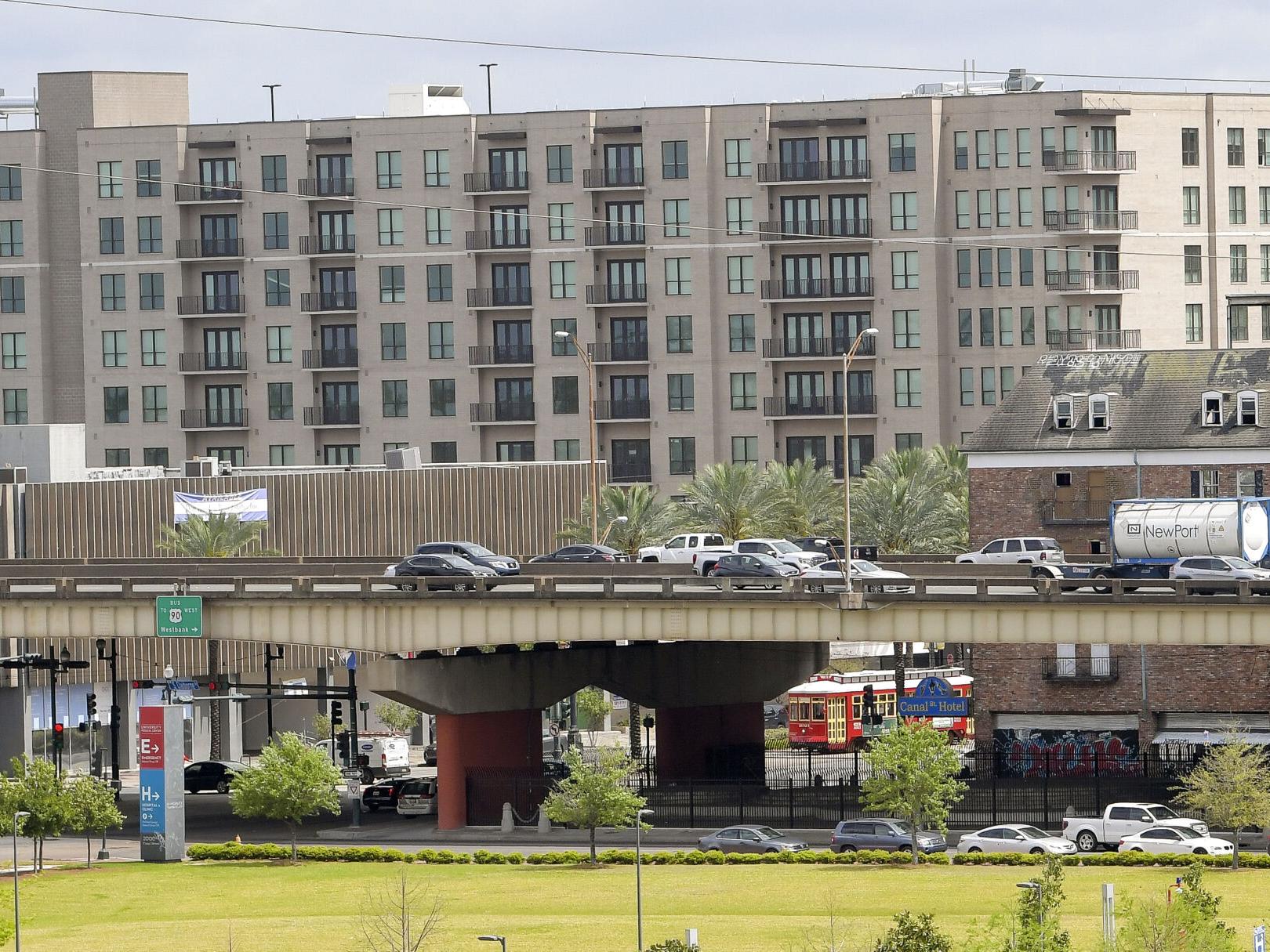Local News
A look at which Louisiana projects could get a piece of Biden’s $2.3T infrastructure plan
Published
5 years agoon
Editor

MONROE, La. – President Joe Biden’s $2.3 trillion infrastructure overhaul could funnel billions of dollars to a wide variety of Louisiana projects, ranging from capping thousands of abandoned oil and gas wells to funding road construction and helping with coastal restoration.
“This is the largest American job investment since World War II,” Biden said in announcing the American Jobs Plan in Pittsburgh, Pa., Wednesday afternoon.
But the pre-Easter basket of goodies — which is likely to face a difficult approval process in Congress — also includes some rotten eggs needed to pay for the aggressive investment in U.S. roads, bridges and other infrastructure, state critics say: an end to federal tax breaks for the state’s important fossil fuel sector and an overall increase in corporate tax rates.
The White House released a lengthy fact sheet Wednesday that detailed many of the proposals. It was light on the details of specific projects — and plans for individual states are expected to be unveiled in coming days — but two Louisiana locations were highlighted as potentially deserving of funding.
In a section explaining how $621 billion would be spent on transportation infrastructure repairs and resilience nationwide, the fact sheet said the plan should “redress historic inequities and build the future of transportation infrastructure.”
“Too often, past transportation investments divided communities – like the Claiborne Expressway in New Orleans or I-81 in Syracuse – or it left out the people most in need of affordable transportation options,” the fact sheet said.
The concrete bridges that extended Interstate 10 above N. Claiborne Avenue were built in the 1960s through the middle of Treme and other neighborhoods. At the time, N. Claiborne was a key business corridor for the city’s Black community, its neutral ground lined with stately oak trees.
The fact sheet promises $20 billion will be dedicated to a new transportation construction program aimed at reconnecting such neighborhoods. It doesn’t specifically say that funding will be directed towards tearing down or relocating parts of the expressway above Claiborne, however.
Any project on the expressway would be located in the heart of Louisiana’s 2nd Congressional District, which was represented until earlier this year by Cedric Richmond who gave up his seat for a senior White House role.
In another part of the fact sheet addressing links between the effects of climate change and infrastructure, it pointed out that Hurricane Laura caused $19 billion of the nearly $100 billion in climate change-linked extreme weather events in 2020, including severe damage to southwestern Louisiana’s water systems and electrical grid.
“Building back better requires that the investments in this historic plan make our infrastructure more resilient in the face of increasingly severe floods, wildfires, hurricanes, and other risks,” the fact sheet said. “Every dollar spent on rebuilding our infrastructure during the Biden administration will be used to prevent, reduce, and withstand the impacts of the climate crisis.”
There’s no indication what project might be planned to directly respond to Hurricane Laura damage.
Gov. John Bel Edwards said in a prepared statement Wednesday that the jobs plan was “refreshingly ambitious,” and hit on several much-needed infrastructure priorities in the state, including transportation, coastal restoration and rural broadband.
“While we do not have all of the detail about how this benefits Louisiana, we have tremendous needs and we intend to take full advantage of what will be made available as this package goes from a framework to legislation,” Edwards said.
The plan calls for $100 billion to be used to expand broadband infrastructure, especially in rural areas where internet connectivity can be spotty or nonexistent. That became a significant problem over the past year as schools nationwide attempted to deal with the COVID-19 pandemic.
The plan also promises to “protect and, where necessary, restore nature-based infrastructure — our lands, forests, wetlands, watersheds, and coastal and ocean resources.”
While that section only specifically names the Florida Everglades and the Great Lakes, the wording suggests that Louisiana coastal restoration and hurricane protection projects could be eligible for a share of the funds. And the plan also promises to set aside $10 billion to train and hire conservation and resilience workers, including the creation of a national Civilian Climate Corps, which could include jobs in Louisiana.
Another part of the fact sheet discusses a plan to target “distressed communities” as potential places to build of one of 15 demonstration projects that would manufacture hydrogen, a non-carbon fuel alternative.
In January, while announcing a series of executive orders addressing both climate change and industrial pollution, Biden pointed to Louisiana’s “Cancer Alley” as an example of an area where his administration would focus on “addressing the disproportionate health and environmental and economic impacts on communities of color.”
The state’s petrochemical and refining industry might also be targeted as part of a plan to establish 10 facilities to demonstrate carbon capture retrofits and installations. The plan calls for expanding tax credits already in place aimed at helping to pay for sequestration plans, which can include pumping carbon into deep aquifers, where it liquefies and stays in place.
Louisiana also could benefit from a plan to put thousands of people to work capping orphaned oil and gas wells and abandoned mines across the nation.
According to the state Department of Natural Resources, Louisiana had 4,527 abandoned wells as of Wednesday. In 2020, the Louisiana Legislative Auditor’s Office estimated it costs an average $30,000 to plug each well. Those jobs often go to specialized oil and gas companies.
The plan proposes major changes in the nation’s corporate tax structure, including a reversal of the Trump Administration’s tax cut, an attempt to limit businesses from using foreign tax havens, and a beefing up of the Internal Revenue Service’s investigation program for businesses, as a way of paying back the $2.3 trillion cost of the infrastructure program over 15 years.
The tax part of the plan didn’t sit well with some corners of Louisiana’s business sector. Stephen Waguespack, president and chief executive of the Louisiana Association of Business and Industry, said that while investments in infrastructure are needed, his group is concerned about the tax plans and expansion of government in the proposal.
“To pay for this plan, there needs to be a funding source that is more sensitive to the current economy and doesn’t penalize the American job creators who are struggling to recover and rebuild,” Waguespack said. “In addition, we urge Congress to take a hard look at this legislation to ensure that it is laser focused on infrastructure and economic growth.”
While Louisiana has lost thousands of oil and gas jobs over the past several years, the sector is still a critical employer across much of the state. The industry also contributes hundreds of millions of dollars in severance taxes to the state budget.
During his Wednesday news conference, Biden repeated his promise that no one making $400,000 or less would see their taxes rise as a result of the plan.
The plan’s tax change proposals include:
- Setting the corporate tax rate at 28 percent, compared to the present 21 percent.
- Eliminating tax subsidies, loopholes and special foreign tax credits for the fossil fuel industry.
- Changing the rules for the global minimum tax for U.S. multinational corporations. The Trump changes allowed businesses shifting profits and jobs oversees to receive a tax exemption for the first 10 percent return on foreign assets, and the restis taxed at half the domestic tax rate. The proposed changes would increase the minimum tax on U.S. corporations to 21 percent and calculate it so that it captures profits in tax havens. The rule also would eliminate a provision that now allows U.S. companies to pay no tax on the first 10 percent of return when they locate investments in foreign countries.
Another change would make it harder for a company to acquire or merge with a foreign company and then claim it was headquartered overseas.
Payments by polluters into the Superdome Trust Fund, used to underwrite cleanup costs at abandoned waste sites, also would be resumed.
The plan also would pay to increase the number of audits of corporations.
“A decade ago, essentially all large corporations were audited annually by the IRS,” the fact sheet said. “Today, audit rates are less than 50 percent.”
Louisiana might also gain funding for projects and related jobs for a variety of the plan’s $621 billion set aside for transportation:
- At least part of the $115 billion that will be dedicated to rebuilding or improving highways and bridges.
- Part of the $20 billion set aside for road safety, including improvements aimed at cyclists and pedestrians.
- A possible doubling of the federal funding provided to transit systems across the state, including the New Orleans Regional Transit Authority.
- A share of the $80 billion that would be used to improve Amtrak rail service.
- Some of the 500,000 electric charging stations that would be funded with $174 billion in grant and incentive programs through 2030.
- State airports might get grants from $25 billion set aside for improvements, including for expansion of car-free access to terminals.
- The plan would set aside $17 billion nationwide for inland waterways, coastal ports and ferries.
Improvements to the nation’s housing and commercial building stock would be targeted with $213 billion, with much of the money aimed at addressing historic inequity in home ownership and rental availability, and home energy costs.
The plan also would create a nationwide program to eliminate all lead distribution pipes and service lines in water systems. There are still numerous lead service lines in New Orleans and both distribution and service lines in other communities.
Another $56 billion in grants and loans would be set aside for modernizing water, with additional money set aside for modernizing wastewater and drainage systems.
In the housing category of the plan, Louisiana may be eligible for a share of:
- A plan to offer targeted tax credits, formula-based funding, grants and rental assistance for more than a million affordable, resilient and energy efficient, electrified housing units.
- Several programs, including one funded by $20 billion in tax credits to build and rehabilitate more than 500,000 homes for low- and middle-income homebuyers.
- A $40 billion program to improve public housing infrastructure.
- Another $27 billion for a new Clean Energy and Sustainability Accelerator program to focus private investment at retrofitting residential, commercial and municipal buildings for clean and efficient energy, with some money aimed at transportation.
- A share of $100 billion aimed at upgrading existing and building new public schools, including $50 billion in direct grants and another $50 billion backed by bonds. The improvements would be aimed at reducing the buildings’ greenhouse gas emissions, and to design them to be resilient to climate-related emergencies.
- Part of a new $12 billion program community college infrastructure improvement program.
- A share of a $25 billion program to upgrade and increase the supply of child care facilities, aimed at communities needing such services.
The plan also includes funding for expanding access to long-term care services under Medicaid, including the “Money Follows the Person” program that promotes moving clients out of nursing homes and back into their own homes or those of other care-givers.





